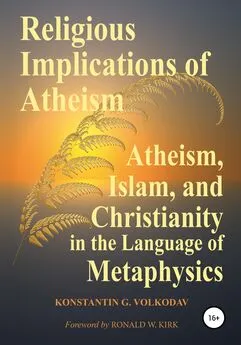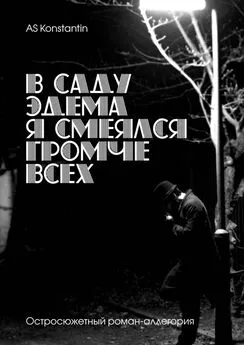Konstantin Volkodav - Religious Implications of Atheism
- Название:Religious Implications of Atheism
- Автор:
- Жанр:
- Издательство:неизвестно
- Год:2021
- ISBN:978-5-532-95383-3
- Рейтинг:
- Избранное:Добавить в избранное
-
Отзывы:
-
Ваша оценка:
Konstantin Volkodav - Religious Implications of Atheism краткое содержание
Religious Implications of Atheism - читать онлайн бесплатно ознакомительный отрывок
Интервал:
Закладка:
Thus, any debate is not able to reveal the topic completely. This is just an entertaining show for those who do not want to read books. Nevertheless, we use them to provide a clear example of the points of view of the parties to the dispute.
[00:03:12–00:03:50] Moderator: But what, of course, we can do to inform our decisions about this debate tonight to use our reasoning, to use our mind, to use our intellect. And really to have an open mind set. Muslim, Non-Muslim, Christian, whatever you are, whatever you believe in, we should have an open mind set and really go at this with sincerity. I am just asking you, I am asking myself first . . .
[00:03:55–00:05:17] Moderator: This evening two major belief systems, if you like, claim to the truth and going head to head. No matter which side of a fence you tend to reside on. But at the end of the night you will be better informed about Atheism and about Islam . . . And after that there will be “crossfire”. Only without weapons! No heavy arms to be use in this section, both of you. Okay? Good? Although, I understand that tongue is a lot more dangerous than nuclear weapons . . .
[00:07:18–00:07:47] Tzortzis: Today’s question: “Islam or Atheism—Which Makes More Sense?” I would argue that if we use our reason, our rational faculties, we will definitely come to the conclusion, that Islam makes more sense. I will use two simple arguments to verify that claim. Argument number one: Islam makes sense of the origin of the universe. Argument number two: Islam makes sense of the nature of the Qur’anic discourse . . .
Comment 5
Tzortzis sets the direction of the whole discussion: “If we use our reason, our rational faculties . . .” Except for a very brief mention of morality, all issues were discussed from a purely rational point of view. This inevitably led to immersion in the field of physics and mathematics, which Tzortzis did not study deeply. Talking to a cosmologist about cosmology without knowing enough science is counterproductive. It is like a student arguing with an academician. Therefore, it is not surprising that Tzortzis looked like a rather weak opponent compared to Krauss, and his arguments were unconvincing even for many Muslims. He should have talked about the “universe” inside a human, about those many amazing qualities that only a human has. Unfortunately, he did not do this, and we do not consider it appropriate to comment on his arguments in detail and will limit ourselves to just a few brief comments.
However, the weakness of Tzortzis’s argumentation does not yet mean the triumph of Krauss’s ideas. Not at all! If believing scientists, who are also among Krauss’s colleagues, were invited to the debate, they would easily expose him wrong.
Comment 6
Logical Arguments and Evidences are Counterproductive in Debates about Religion
One can relate to the Bible in different ways, believe it or not, but one thing is undoubtedly: on its basis it is possible to build a consistent theory of human psychology. It has stood the test for millennia. In natural sciences, no theory has been tested for so long.
One of the key points of the biblical concept is the story of the tree of the knowledge of good and evil. As an educational measure so that the first man could show trust and love, the LORD God commanded the man: “You may freely eat of every tree of the garden; but of the tree of the knowledge of good and evil you shall not eat, for in the day that you eat of it you shall die” (Gen. 2:16–17). However, Eve succumbed to the temptation of the serpent (devil), lusted after the forbidden fruit of knowledge, ate, and gave it to her husband (Gen. 3:6). The devil always deceives by representing God as envious and wicked. However, the intellectual knowledge that devil offered, apart from trust and love for God, easily becomes evil. There have been and still are many evil geniuses in the world, people whose intellectual abilities are undoubtedly outstanding, but they are possessed by evil.
In the fallen world, knowledge has always been highly valued as a means that gives power over nature and other people. Pagan priests and magicians, Platonists, Gnostics and many others up to modern atheists—all gave priority to knowledge.
The biblical texts also praise wisdom and knowledge (and vice versa, ignorance and stupidity are condemned). However, the context suggests that wisdom and knowledge should follow sincere love for God and neighbor, truth and virtues. Thus, the Bible distinguishes between wisdom coming from above (which is full of mercy and good fruits, impartial and unfeigned), and earthly, spiritual, demonic wisdom (James 3:15).
King Solomon wrote:
“My child, if you accept my words and treasure up my commandments within you, making your ear attentive to wisdom and inclining your heart to understanding; if you indeed cry out for insight, and raise your voice for understanding; if you seek it like silver, and search for it as for hidden treasures—then you will understand the fear of the LORD and find the knowledge of God. For the LORD gives wisdom; from his mouth come knowledge and understanding” (Prov. 2:1–6).
At the beginning of the fourth century, the persecution of Christians in the Roman Empire ceased [6] . The Edict of Milan (Lat. Edictum Mediolanense) of 313 proclaimed religious tolerance in the territory of the Roman Empire, and Christianity became legal.
, and, shortly after the accession of Emperor Constantine, Christianity rose to the status of a state religion. However, because of this entry into the Hellenistic world, Christianity was subjected to the colossal influence of Greco-Roman culture. From Neo-Platonism, ideas about intellectual knowledge as a self-sufficient virtue were perceived. Of course, we note only a general trend, and there have been exceptions to it always and everywhere.
Theology began to appeal to the intellect, to be presented logically, as a scientific system. In the West, Thomas Aquinas (1225–1274) succeeded in this. In his fundamental work Summa Theology (Lat. Summa Theologiae), he outlined five proofs of the existence of God based on the Logic (science) of Aristotle. Almost the same was done in the East. For a whole millennium, this has become a trend. Many books have been written where the existence of God was proved, based on intellect and common sense.
By the way, Islamic thought followed in the same direction (it is no coincidence that Tzortzis refers to the rational evidence of medieval Islamic theologians). Islamic theologians could simply rewrite the evidences for the existence of God from Christians, since in this respect Christianity and Islam speak of the same things. In general, the formation of Islam was influenced by Christian asceticism, Buddhism and Neo-Platonism. However, that is another topic.
In Christian countries, secondary and higher education included the study of various kinds of evidence of the existence of God. Then atheism appeared, other books were written, where, on the contrary, it was proved that there is no God, and with references to reason and common sense. They began to teach young people using these books. In the Soviet Union, for about seventy years, atheism was actively promoted, forbidding access to any positive information about religion. However, as soon as the communist regime fell, people began to convert to Christianity en masse. Old and new religious books were reprinted. After thirty years, some of the Christians, seeing the unworthy behavior of some representatives of the church, became disillusioned with Christianity and began to convert, some to another religion, some to Atheism.
It was the same in Turkey, where Mustafa Kemal began to instill secularism in the 1920s. Kemal admired science and saw the happiness of humanity in scientism. Nevertheless, propaganda of atheism did not help. After several decades, in Turkey people again began to turn to religion en masse.
This story repeats itself for centuries. Not all the numerous proofs, both on the one and on the other hand, somehow help. It is high time to understand that logical proofs in the field of metaphysics do not work! This is an area where everything depends on the choice between good and evil, between virtue and vice. Logic and common sense can play a supporting role here, but not the main one.
[00:10:50] Tzortzis: . . . But what have cosmologists said? They have said, for example, Alexander Vilenkin, in his book Many Worlds in One [7] . See Vilenkin, Many Worlds in One , Part IV—Before The Beginning. Chapter 16—Did The Universe Have a Beginning? Beyond Unreasonable Doubt.
, which I believe is a friend of prof. Krauss, he says, “With the proof this we place, cosmologists can no longer be hide behind the possibility of the past eternal universe. There is no escape. They have to face the problem of the cosmic beginning”. And just to know, even prof. Krauss in his book affirms a beginning to the universe . . .
Comment 7
Great quote! In it, atheists expose themselves. Not a single discovery of physics is spoken of in such terms. Elsewhere in the book, Alexander Vilenkin frankly says that the atheists really did not want to, but there was no way out, and they had to admit the fact of the beginning of the world, which was inconvenient for them. Moreover, it began from nothing, and not from the previous infinite universe.
From the fact of the beginning naturally follows the question of the Cause of this beginning and this fact confuses atheists. Therefore, in the atheistic USSR, the Big Bang theory was denied for thirty years, insisting on the postulate of the infinity and eternity of matter, that is, the “Big Bang” was viewed as the transition of uncreated and indestructible matter from one state to another. In 1955, a Soviet author wrote in an astronomical journal, “The Marxist-Leninist doctrine of an infinite universe is a fundamental axiom at the basis of Soviet cosmology . . . Denial or avoidance of this thesis . . . has nothing to do with science.” [8] . Quoted from: Wetter, A Historical and Systematic Survey , 436.
This is how Soviet atheism, which proudly called itself “scientific”, considered Marxist-Leninist axioms, that is, statements taken on faith, as its foundation.
In fact, the so-called “scientific” atheism has nothing to do with science. It is a set of atheistic dogmas, as a sacrifice to which hundreds of real scientists were expelled from the profession, and many were arrested and convicted. [9] . Legler wrote that during all periods of Soviet history from the 1920s to the time of writing the book (1985), Soviet science (all its areas, including natural sciences) was under the influence of the state (atheistic) ideology. See Леглер, Научные Революции при Социализме .
For example, the world famous scientist Academician N. I. Vavilov (by the way, he was a deeply religious Orthodox Christian) was sentenced to be shot [10] . Academician Nikolai Vavilov (1887–1943) died on death row. He was a famous geneticist, vice president of the All-Union Academy of Agricultural Sciences. In 1948, all genetic research in the USSR was discontinued. Hundreds of leading professors and instructors have been fired. Biology books based on genetics were seized and destroyed from libraries.
because he dared to criticize the erroneous views of Lysenko for the sake of scientific truth.
[00:24:00] Tzortzis: Before I get into that, we have to now discuss what a miracle is? The word comes from the Latin word miraculum, meaning something wonderful. And the traditional Western philosophical definition of the miracle, as summarized by David Hume in his An Enquiry Concerning Human Understanding. [11] . David Hume (1711–1776) was a Scottish Enlightenment philosopher, historian, economist. An Enquiry Concerning Human Understanding (1748) contains reworking of the main points of the “Treatise”, with the addition of material on free will, miracles, the Design Argument, and mitigated scepticism. Section 10, On Miracles , of the Enquiry, was often published separately.
He says that it is a transgression of natural law. We do not agree with that definition. Because what are natural laws? Natural laws are just inductive generalizations of patterns we can see in the universe . . . That the profound Islamic theologians and thinkers have done, they redefined that a miracle is, based on the Qur’anic discourse. And they have said, that a miracle is an event that lies outside the productive capacity of nature. Which means, when you go to a nature of the event . . . there is no naturalistic cause or link between the event and the nature of the event . . .
Интервал:
Закладка:

![Константин Бальмонт - Константин Бальмонт и поэзия французского языка/Konstantin Balmont et la poésie de langue française [билингва ru-fr]](/books/613502/konstantin-balmont-konstantin-balmont-i-poeziya-frantsuzskogo-yazyka-konstantin-balmont-et-la-po-sie-de-langue-fran-aise-bilingva-ru-fr.webp)






